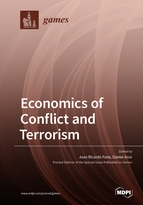Economics of Conflict and Terrorism
A special issue of Games (ISSN 2073-4336). This special issue belongs to the section "Applied Game Theory".
Deadline for manuscript submissions: closed (1 December 2021) | Viewed by 21483
Special Issue Editors
Interests: macroeconomics; development economics; economics of entrepreneurship; economics of terrorism and conflict; economics of education
Special Issue Information
Dear Colleagues,
Terrorism is the intentional use (or threat of use) of violence against civilians or inactive military personnel in order to influence an audience beyond the immediate victims for the purpose of achieving political, ideological, or religious goals. Thus, terrorism is itself a strategy, as is counterterrorism. This engenders a situation of mutual interdependence that lends itself to game-theoretic analysis for the purposes of gaining insight into terror activities and counterterror policies. The same can be said for other forms of conflict, including civil war, genocide, insurgency, and guerilla warfare.
This Special Issue is devoted to contributions that focus on the economics of conflict and terrorism. Applications can be widespread and may include theoretical and applied papers on issues related to counterterrorism, domestic terrorism, transnational terrorism, externalities, terror cycles, alliances, coalitions, value of intelligence, cyberterrorism, signaling, civil wars, refugees, violent manifestations, and organized crime.
Prof. Dr. Joao Ricardo Faria
Prof. Dr. Daniel Arce
Guest Editors
Manuscript Submission Information
Manuscripts should be submitted online at www.mdpi.com by registering and logging in to this website. Once you are registered, click here to go to the submission form. Manuscripts can be submitted until the deadline. All submissions that pass pre-check are peer-reviewed. Accepted papers will be published continuously in the journal (as soon as accepted) and will be listed together on the special issue website. Research articles, review articles as well as short communications are invited. For planned papers, a title and short abstract (about 100 words) can be sent to the Editorial Office for announcement on this website.
Submitted manuscripts should not have been published previously, nor be under consideration for publication elsewhere (except conference proceedings papers). All manuscripts are thoroughly refereed through a single-blind peer-review process. A guide for authors and other relevant information for submission of manuscripts is available on the Instructions for Authors page. Games is an international peer-reviewed open access semimonthly journal published by MDPI.
Please visit the Instructions for Authors page before submitting a manuscript. The Article Processing Charge (APC) for publication in this open access journal is 1600 CHF (Swiss Francs). Submitted papers should be well formatted and use good English. Authors may use MDPI's English editing service prior to publication or during author revisions.
Keywords
- Differential games
- International public goods
- Externalities
- Counterterrorism
- Terrorism recruitment
- National security
- Homeland security
- Civil War
- Genocide
- Cyberterrorism







